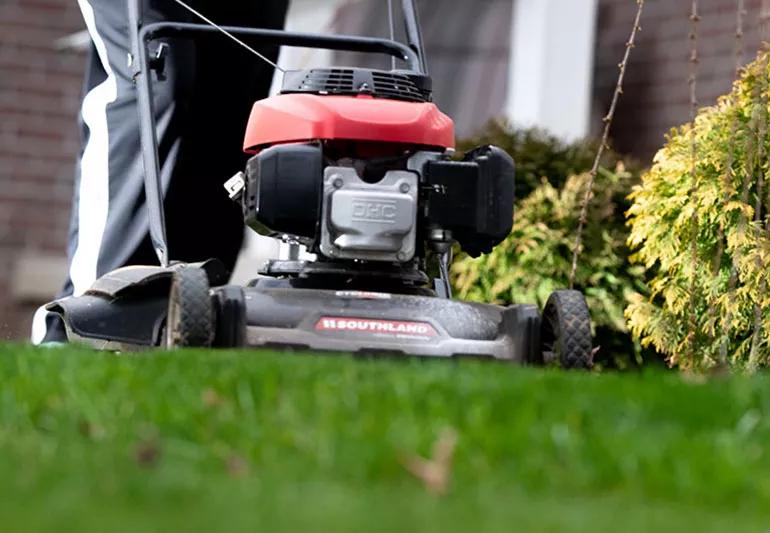Life during the coronavirus outbreak is hard. Give yourself a break.

Image content: This image is available to view online.
View image online (https://assets.clevelandclinic.org/transform/cf1af9c3-18d7-4010-ab0c-73b6dc69394c/covidSlack-MC_032620-770x533-1_jpg)
Mowing lawn during covid-19
You haven’t learned a new language, reorganized your closet or baked a single loaf of bread. If you believe your social media feed, you are the world’s biggest coronavirus slacker.
Advertisement
Cleveland Clinic is a non-profit academic medical center. Advertising on our site helps support our mission. We do not endorse non-Cleveland Clinic products or services. Policy
Pro tip: Your social media feed is a liar. Yes, you may have some overachieving friends perfecting their sourdough recipes during self-isolation. But there are plenty of good reasons to go easy on yourself, says psychologist Scott Bea, PsyD.
“We’ve been forced into this novel situation, and it’s draining,” he says. “Few of us are living up to our ideals right now, and it’s important to cut yourself some slack.”
In general, most of us aren’t great at giving ourselves a break. “We’ve internalized a lot of perfectionism in our culture,” Dr. Bea says. “We worry that if we cut ourselves some slack, we’re lazy, or terrible things will befall us.”
But a lot of the standards we set for ourselves are ridiculously high and not very helpful, especially during a global pandemic. “Humans rely on habits to make our lives easier and reduce tension. We’ve had to adapt our habits to this new situation, and our brains have to figure out a lot of things we’ve never rehearsed before,” Dr. Bea says.
Maybe you’re figuring out how to work from home for the first time or how to deal with unemployment. You might be working out how to manage homeschooling or how to get along with your roommates in cramped quarters, 24/7. No wonder you feel like you could sleep for a week. “That exhausted feeling is legitimate because your brain is working harder than it’s used to,” Dr. Bea adds.
Advertisement
You know what’s worse than feeling exhausted? Feeling exhausted and also guilty about not being more productive. But it doesn’t have to be that way.
With practice, you can learn to give yourself a break. These ideas from Dr. Bea will help you get started.
What you see on social media isn’t real life. Still, your news feed might fool you into thinking that other people are thriving in social isolation. “It can produce a lot of feelings of ‘poor me,’ even though we know people are posting sanitized realities,” Dr. Bea says. “Now, especially, it can be useful to limit social comparisons.
We’re often harder on ourselves than we are on other people. Start treating yourself like you would your best friend. “It’s an acknowledgment that we’re human. We are all flawed, and it’s helpful to adjust your expectations to accept that,” he says.
Make a daily list of things you’re grateful for to help you learn to appreciate what went right, instead of judging what you did wrong. You can put a spin on the gratitude journal by noting your accomplishments, no matter how small.
You’re grateful you managed to get dressed today. Or you called a friend who’s been struggling. Or you didn’t lose your temper when your dear child started arguing for more screen time yet again. You’re accomplishing more than you realize. “We can train our brains to notice the good,” Dr. Bea says.
A lot of us are stressed and sad right now. We don’t need more pressure to meet unrealistic goals. But it can be a boost to accomplish smaller goals.
Instead of telling yourself you should be working on a novel, set aside a few minutes a week to write in your journal. Rather than tell yourself you should be planting a vegetable garden, spend some time mowing the lawn or pulling weeds. “Being a little active toward things we feel are worthwhile can produce good feelings,” he says.
The pandemic won’t last forever, but learning to go easy on yourself is a skill that will keep on giving. “We often face a bevy of self-criticism, but we can become more practiced at cutting ourselves some slack,” Dr. Bea says.
Advertisement

Sign up for our Health Essentials emails for expert guidance on nutrition, fitness, sleep, skin care and more.
Learn more about our editorial process.
Advertisement
The short answer: It’s complicated, but the basic care precautions still prevail, like washing your hands and isolating if you’re sick
They can feel like a typical headache or a migraine headache, but the pain can last for weeks to months
Any large social gathering — from a family birthday party to an indoor music concert — has the potential to spread serious infection
It’s important to connect with a healthcare provider, get quality sleep and balance your activities with your energy levels
Just like the flu, COVID-19 will continue to evolve every year
The duration varies, but symptoms can linger for a few days up to a couple weeks or more
Vaccination is best for prevention, but if you get sick with COVID-19, treatments are available
The virus lives best in humans, but it can last on hard surfaces, like doorknobs and railings
Type 2 diabetes isn’t inevitable with these dietary changes
Applying a hot or cold compress can help with pain
Pump up your iron intake with foods like tuna, tofu and turkey